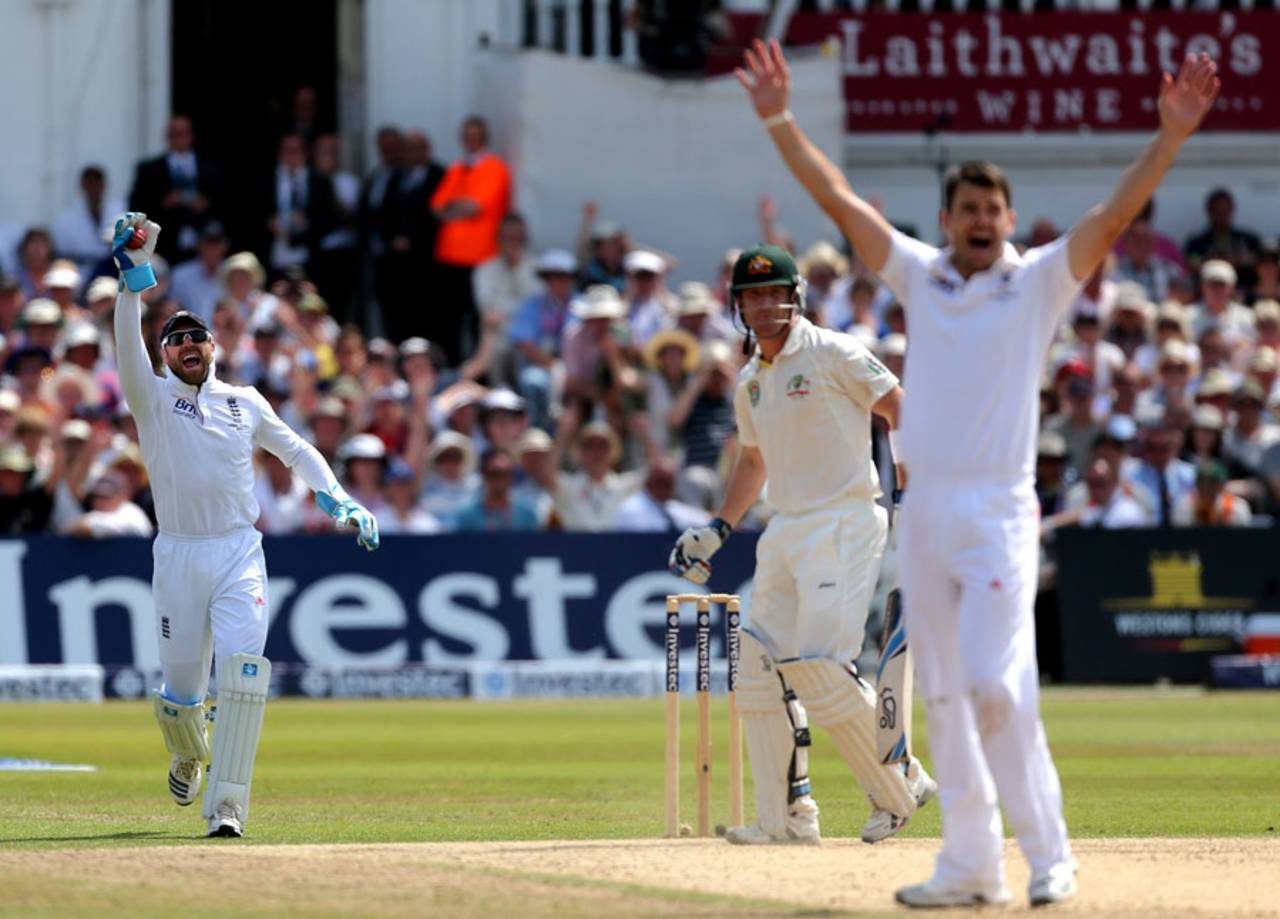Are England sloppy or have our expectations been raised?
After the grim nadir of the '80s and '90s, England fans have become used to their team winning again - and that, paradoxically, can be frustrating
Jonathan Wilson
Jul 15, 2013, 5:18 AM

England infuriate by not making the most of their ability, but at least these days there is some ability to fail to make the most of • PA Photos
Peter Alliss, once the heaviest baby born in Europe, then a Ryder Cup golfer, and now an amiable buffer in the commentary box, isn't necessarily somebody I'd usually turn to as a source of wisdom, but he did once say something profound about the nature of perspective and expectations in sport. He hated playing against weekend golfers, he said, because he would come off the course having hammered them, only to find them beaming and describing in detail the two good shots they hit in their round of 90, while he dwelt on the two bad shots he'd played in his round of 70.
It's true of everything, of course. If Manchester United beat, say, Whitley Bay 4-1 in the FA Cup, they would fret about misplaced passes and the goal they conceded, while Bay would revel in having scored a goal at Old Trafford. The pathetically low standard of cricket I play means that the odd ball that turns or the occasional crisp drive stands out above the long hops that are battered for four or the ugly hoicks caught at midwicket. And it says much for the improvement in English cricket that the pervading mood, even after the euphoria of Sunday, seems one of frustration.
We spent much of the eighties and nineties grateful for any slight crumb of comfort. We remember Mike Atherton and Jack Russell's resistance in Johannesburg in 1995 and conveniently forget that England were thrashed by ten wickets in the fifth Test to lose the series.
We remember Darren Gough's half-century and six-for in Sydney earlier the same year and ignore the fact that Australia drew on their way to another series win. Mark Butcher's stunning 173 not out to win the game at Headingley in 2001 was in a dead rubber (and came, although it seems churlish to mention it, 30 innings after a 33-month spell in which he made only one Test
half-century). Even Graham Gooch's majestic 154 not out at Headingley in 1991 tends to be recalled without reference to the fact that England then lost two of the next three Tests pretty dismally before Phil Tufnell's heroics at The Oval.
But England fans now have become more familiar with winning. Glorious failure no longer feels appropriate. Where once we revelled in unlikely rearguards from John Emburey, Phil DeFreitas or Ian Salisbury, now we wonder how on earth we got in such a mess as to need another belligerent knock from Stuart Broad or Tim Bresnan. What's strange is that the change of mentality seems to have coincided with a period of sloppiness in English cricket.
Do we perceive sloppiness because our expectations have been raised? Is sloppiness that has always existed more noticeable now because standards have been raised - in that a rash shot on 20 is more frustrating than a rash shot on 0? Is it that Kevin Pietersen and Ian Bell are batsmen of such grace the game occasionally seems to come too easily to them? Or is the sloppiness in itself a result of standards being raised in that a certain complacency has been induced? Is it even that the strength of England's tail, certainly relative to the eighties and nineties (even if it was distinctly unimpressive at Trent Bridge), makes the top order more likely to take risks?
The stats suggest sloppiness is increasing. As Andy Zaltzman pointed out, the first innings of this Test at Trent Bridge was the third time in the past 18 months that all the England top six had got into double figures but failed to get to 50; it had happened three times in the previous half-century. It's often suggested, probably with good reason, that the inability of modern batsmen to bat time is down to the growing influence of T20 cricket. Personally I blame the retirement of Paul Collingwood, a player who by squeezing every last drop out of his talent, by force of example, encouraged his team-mates similarly to do likewise. Gamecraft is infectious.
It's not just the batting. After a few years of reliably bowling dry, denying batsmen easy runs and pouncing on any mistake, for all the excellence of James Anderson and Graeme Swann, other England bowlers - Steven Finn in particular - at times seem distinctly hittable. Again, you lament the discipline that Collingwood seemed to bring the team in general.
But then you step back, and you remember watching the likes of Simon Brown, Martin McCague, Greg Thomas, Mike Smith, Alex Tudor, Phil Newport, and Sid Lawrence getting carted to all corners. You think back to the days when Devon Malcolm's radar went awry or DeFreitas started banging it in short, and you realise how little the modern England fan really has to complain about. Having grown up in the golden age of the England collapse, even a scorecard without single figures is vaguely comforting even when none of them get to 50.
It's infuriating at times that England don't make the most of their ability, but at least these days there is some ability to fail to make the most of. Supporting a successful side, paradoxically, seems a much more negative experience than the blissful resignation of the days of failure.
Jonathan Wilson writes for the Guardian, the National, Sports Illustrated, World Soccer and Fox. He tweets here